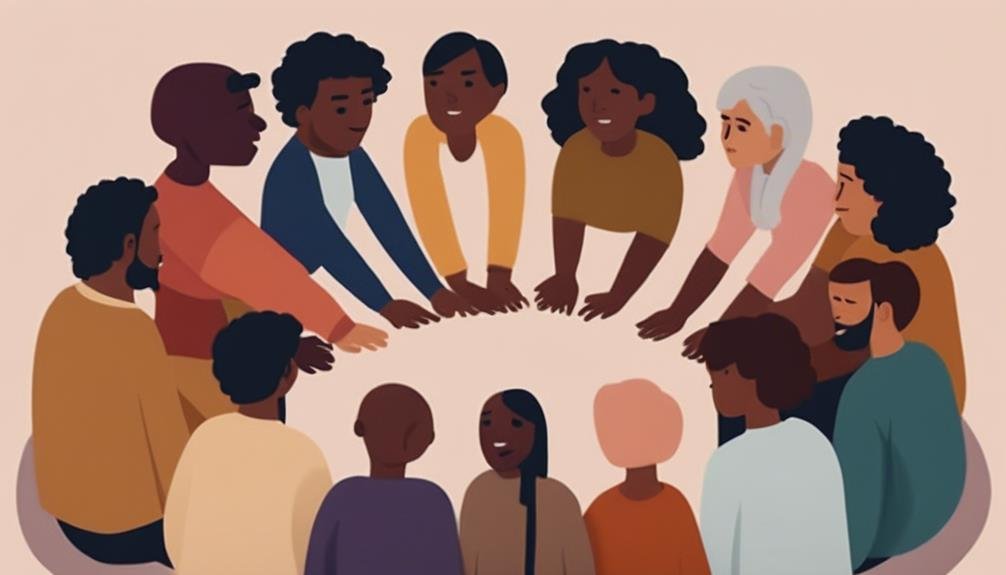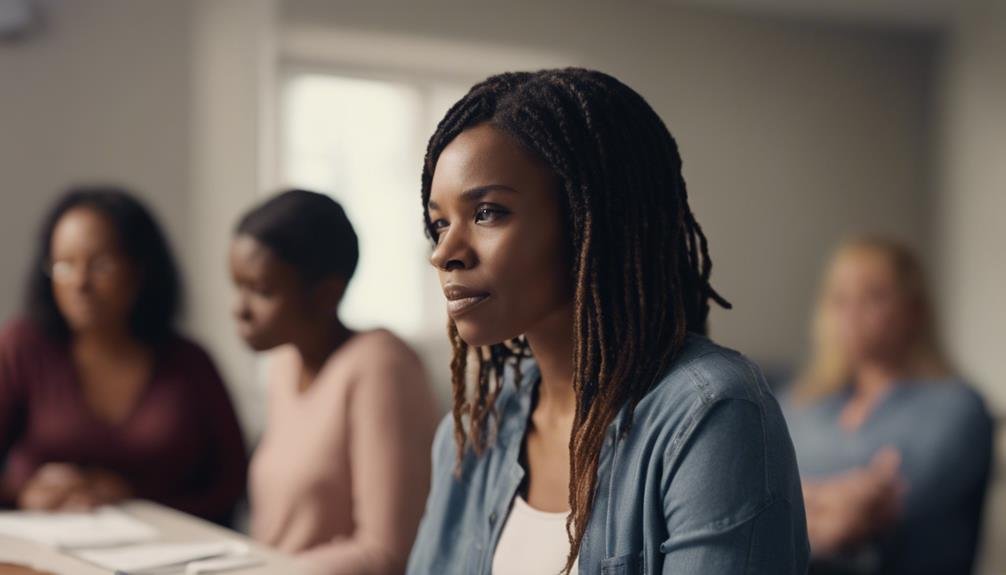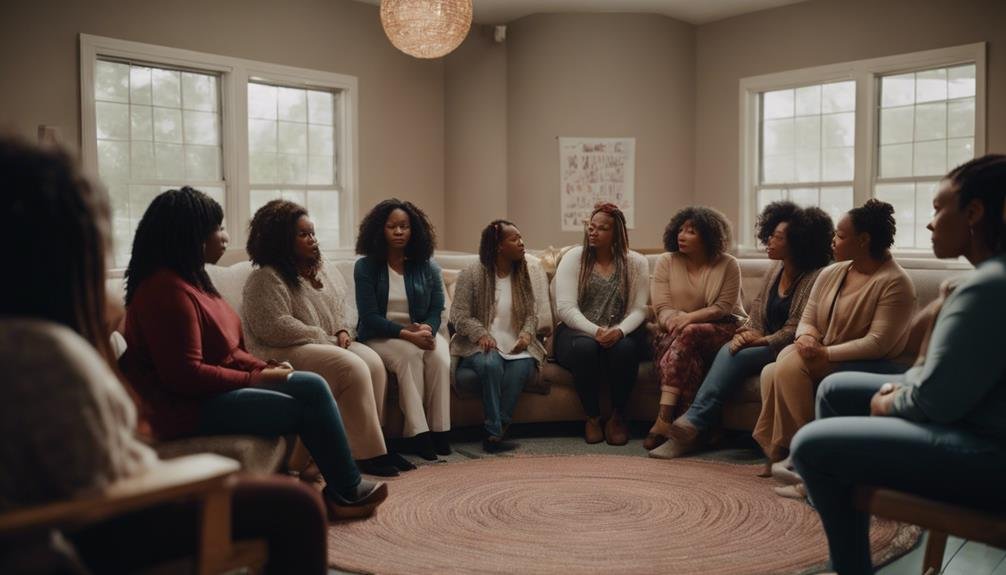Find the Navigating Recovery: Counseling Options for Domestic Abuse Survivors is demanding, but counseling options serve as guiding lights. Therapists offer safe spaces to process and heal from traumatic experiences. Tailored LGBTQIA+ services understand unique challenges faced by individuals. Trauma-informed counseling focuses on developing coping strategies and addressing triggers. Bilingual services enhance cultural sensitivity and bridge communication barriers. Support groups provide comfort, empowerment, and coping strategies. Additional resources include legal aid, shelter contacts, and 24/7 crisis support. Prioritizing confidentiality and sensitivity in counseling nurtures safety and trust. These avenues offer crucial support on your journey to recovery.
Key Takeaways
- Counseling provides a safe space for survivors to process trauma.
- Therapists create nurturing environments for healing and growth.
- Support groups offer connection, empowerment, and coping strategies.
- Trauma-informed counseling focuses on healing and coping strategies.
- Seeking professional help is essential for managing psychological repercussions.
Types of Domestic Abuse Counseling
Explore the various types of domestic abuse counseling available to survivors seeking support and healing. Survivors of domestic violence often face immense challenges in coping with the aftermath of abuse. Counseling offers a safe space for survivors to process their experiences, develop effective coping strategies, and rebuild their self-esteem. Therapists specializing in domestic abuse create a nurturing environment where survivors can heal at their own pace.
Counseling for perpetrators focuses on addressing abusive behaviors, exploring underlying causes, and teaching healthier communication skills to prevent future harm. Families impacted by abuse can benefit from therapy that addresses the effects on children and helps repair damaged relationships within the family unit.
Seeking professional help through therapy is essential for managing the psychological repercussions of abuse and fostering a path towards healing and recovery. Remember, you aren’t alone in this journey, and support is available to help you navigate through these challenging times.
LGBTQIA+ Counseling Services
Specializing in providing tailored support for survivors within the LGBTQIA+ community, LGBTQIA+ counseling services offer essential assistance for individuals facing intimate partner violence. These services understand the unique challenges faced by LGBTQIA+ individuals, including hate violence and discrimination, and provide a safe space for survivors to seek help.
With over 84% of Native women experiencing violence in their lifetimes, the need for specialized support services becomes apparent. LGBTQ individuals may encounter intimate partner violence at rates equal to or higher than heterosexual individuals, underscoring the significance of tailored counseling.
LGBTQIA+ counseling services prioritize sensitivity, respect, confidentiality, and advocacy for survivors. They offer support groups, referrals, and advocacy services in both English and Spanish to make sure that survivors receive the in-depth support they deserve.
Trauma-Informed Counseling Options
Trauma-informed counseling provides specialized therapy tailored to individuals impacted by intimate partner violence, focusing on healing and developing effective coping strategies.
This form of therapy is designed to create a safe and supportive environment where survivors can address their trauma, rebuild self-esteem, and manage the psychological aftermath of abuse.
Therapists trained in trauma-informed care work with survivors to identify triggers, process emotions, and develop healthy coping mechanisms to navigate the healing journey.
Bilingual Counseling Services AvailableNavigating Recovery: Counseling Options for Domestic Abuse Survivors
Enhancing accessibility and cultural sensitivity, bilingual counseling services cater to domestic abuse survivors in need of language-specific support. These services, available in English and Spanish, aim to bridge communication gaps and provide a safe space for healing.
By offering therapy in both languages, counselors guarantee survivors can express themselves effectively and feel understood during sessions. Accessing counseling in a language survivors are comfortable with promotes inclusivity and support, essential for those managing the challenges of domestic violence.
Bilingual counselors play a pivotal role in breaking down language barriers and fostering a welcoming environment for survivors seeking help. The culturally sensitive approach taken by these counselors acknowledges the unique needs of individuals from diverse backgrounds, facilitating a more thorough healing journey.
If you or someone you know is a survivor of domestic abuse, consider reaching out to bilingual counseling services for tailored support in your preferred language. Your healing and recovery are important, and these services are here to assist you every step of the way.
Support Groups for Survivors

For survivors of domestic abuse, seeking support groups can provide a valuable source of comfort and empowerment in managing the healing process. Support groups help survivors by providing a vital space where individuals can connect, share experiences, and receive emotional support. These groups offer a sense of community, validation, and understanding, making survivors feel less isolated and more empowered in their journey towards healing.
In these supportive environments, survivors can learn coping strategies, self-care techniques, and gain access to valuable resources for recovery. Many support groups incorporate structured discussions, educational materials, and guest speakers to enhance the healing process and provide a holistic support system. Whether facilitated by trained professionals, peers, or a combination of both, these groups create a confidential and supportive environment for all participants, fostering a sense of belonging and strength among survivors.
Support groups play an essential role in helping survivors navigate their recovery journey with understanding and compassion.
Advocacy Services for Safety Planning
You can rely on advocacy services to help you create a safety plan that suits your unique situation and needs.
These services offer essential guidance and resources to assist you in safeguarding your well-being and future.
Safety Planning Basics
Consider reaching out to advocacy services for essential safety planning tailored to your unique circumstances and needs.
Safety planning is a crucial resource for survivors of domestic abuse, offering strategies to enhance safety and security. Advocacy services specialize in crafting individualized safety plans, which may encompass steps for emergencies, connecting with support systems, and accessing essential resources.
These plans are designed to empower survivors, mitigating the risk of further harm or violence. By engaging with safety planning services through confidential and supportive advocacy programs, survivors can take proactive steps towards enhancing their well-being and ensuring their safety.
Supportive Advocacy Services
Understanding the complex landscape of safety planning as a survivor of domestic abuse can be overwhelming, but supportive advocacy services are here to provide tailored guidance and assistance. Advocacy services play an essential role in helping individuals affected by domestic violence navigate the challenging path towards safety.
These services offer a holistic approach to safety planning, assisting survivors in accessing resources, legal options, and emotional support necessary for their well-being. Advocates work closely with survivors to create personalized safety plans that address their unique circumstances, including securing housing, financial resources, legal protection, and emotional well-being.
Referrals for Additional Support Resources

You’ve shown incredible strength in seeking help for the challenges you’ve faced.
To further support you on your journey towards healing, we can explore referrals to support groups where you can connect with others who understand your experiences.
Additionally, legal aid information and local shelter contacts can provide you with essential resources and guidance as you navigate your path to safety and recovery.
Support Group Referrals
When seeking additional support resources as a survivor of domestic abuse, support group referrals can be a vital avenue to connect with others who understand and empathize with your experiences.
Support groups offer a unique form of peer support where survivors can share their stories, receive encouragement, and feel less alone in their journey towards healing. These groups provide a safe space for survivors to rebuild their strength, gain insights from others who’ve faced similar challenges, and form a sense of community.
Through support group referrals, survivors can access the empathy, validation, and understanding that are essential for fostering a sense of belonging and solidarity.
By engaging with support groups, you have the opportunity to connect with individuals who can offer emotional support, share coping strategies, and empower you on your path to recovery.
Legal Aid Information
For survivors seeking additional support resources, legal aid information offers valuable referrals to navigate the legal aspects of domestic abuse. Legal aid services can provide assistance with various legal issues related to domestic violence, such as obtaining protective orders, court accompaniment, legal representation, and referrals to pro bono services.
By accessing legal aid information, survivors can gain a better understanding of their legal rights and options when dealing with domestic abuse situations. This support is essential for individuals facing intimate partner abuse, as it can empower them to make informed decisions and seek the help they need to protect themselves and their families.
With the guidance of legal aid services, survivors can navigate the complexities of the legal system more effectively, ensuring that they receive the necessary support and resources to address their situation with confidence and clarity.
Local Shelter Contacts
Local shelter contacts offer crucial referrals for survivors seeking additional support resources in their journey to overcome domestic abuse. These shelters provide a safe haven for individuals experiencing domestic violence, offering counseling, advocacy, and a range of tailored services to aid in the recovery process.
If you or someone you know is in need of support, reaching out to local shelters through hotlines, community organizations, or law enforcement can connect you to the help you deserve.
Confidentiality and safety are top priorities at these shelters, ensuring a secure environment for survivors and their children. Operating 24/7, these shelters stand ready to offer the assistance needed to navigate the challenges of domestic abuse.
Confidentiality and Sensitivity in Counseling
Prioritizing confidentiality and approaching survivors with sensitivity are fundamental elements in counseling sessions for domestic abuse survivors. Maintaining confidentiality guarantees that survivors feel safe to disclose their experiences without the fear of their information being shared. This confidentiality creates a space where survivors can open up about the trauma they’ve endured and work towards healing without worrying about judgment or repercussions.
Approaching survivors with sensitivity is equally essential in counseling. Therapists recognize the emotional impact of domestic abuse and validate survivors’ feelings, creating a supportive environment for them to express themselves. Sensitivity helps survivors feel heard and understood, fostering a sense of safety and trust in the therapeutic relationship.
Accessing 24/7 Crisis Support Services

Maintaining confidentiality and ensuring sensitivity in counseling sets the foundation for survivors to access 24/7 crisis support services effectively. When in a crisis, reaching out for help is essential.
The National Domestic Violence Hotline offers free, confidential crisis intervention, safety planning, and support round the clock. This invaluable resource provides services like emergency shelter, legal advocacy, counseling, and support groups, tailored to help individuals affected by intimate partner violence. Funded by grants from the U.S. Department of Health and Human Services and the Office for Victims of Crime, the Hotline guarantees a wide range of resources for survivors.
Additionally, community outreach efforts include professional training, educational workshops, and awareness campaigns to combat domestic violence effectively. Seeking assistance through therapy, support groups, and legal aid is a crucial step towards creating a path to safety and healing from the trauma of domestic abuse. Remember, you aren’t alone, and help is available 24/7 to support you in your journey to recovery.
Frequently Asked Questions
What Are the Coping Mechanisms of Survivors?
You cope with survivors often through self-care practices, support groups. Therapy options and healing techniques assist you in managing healing. Seek professional help and connect with others to find strength and resilience on your journey.
Conclusion
So there you have it, folks – just a quick guide to managing recovery from domestic abuse.
Remember, counseling is just one tool in your toolbox for healing, but it’s an important one.
So don’t be afraid to reach out for help and take care of yourself.
And if all else fails, there’s always a good ol’ pint of ice cream waiting for you at the end of a tough day.
Stay strong, you’ve got this!






